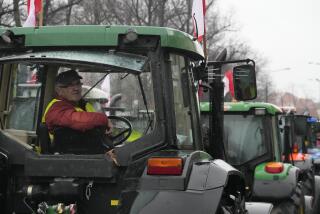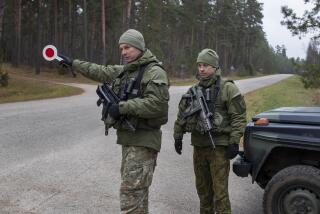Official Lithuania Protest Accuses U.S. of Interference
- Share via
VILNIUS, Soviet Union — An official demonstration was held Monday in the capital of the Soviet republic of Lithuania to protest alleged U.S. interference in Baltic affairs, and authorities cracked down on nationalists to prevent protests marking Lithuania’s short-lived independence.
Today marks the 70th anniversary of Lithuania’s declaration of independence on Feb. 16, 1918, only months after the Bolshevik revolution brought Communists to power in Russia.
Lithuania, along with the neighboring Baltic states of Estonia and Latvia, was absorbed by the Soviet Union in 1940, a year after a Soviet pact with Nazi Germany consigned most of the country to the Soviet sphere of influence.
The United States has never recognized the incorporation of the Baltic states by the Soviet Union, and U.S. politicians still speak out in support of Baltic nationalists.
President Reagan, with support from the U.S. Congress, issued a proclamation Thursday calling for observance of the 1918 anniversary despite Soviet protests that this is interference.
U.S. Action Targeted
The U.S. action was the main target of the officially sanctioned hourlong demonstration attended by about 2,000 people.
“Leave Lithuania Alone,” said one banner. “Mr. President From Across the Ocean Stop This Interference,” said another. Other demonstrators unfurled the Lithuanian Soviet republic flag of green and red with a hammer and sickle in the corner.
A resolution printed in Lithuania’s main newspapers declared: “We protest in the strongest terms this blatant political action by the President and the U.S. Congress.”
One demonstrator, 22-year-old worker Richard Kazakavicus, bitterly objected to “U.S. meddling” in Lithuanian affairs.
“We have our own government and can decide our own internal affairs,” said the tall blond man, who was clad in jeans and a denim jacket.
‘It’s That Simple’
But an elderly man who refused to give his name, saying he feared arrest, said Vilnius factory and office workers had been forced to attend the rally. “They just drove them in,” he said. “It’s that simple.”
Another participant said each Vilnius workplace had been told to provide 10 people for the rally on the square next to the city’s former Roman Catholic cathedral, which now houses an art gallery.
Authorities made it clear they wouldn’t tolerate any show of nationalist sentiment Tuesday.
Lithuanian nationalist Nijole Sadunaite said Communist Party authorities had distributed a warning in offices and factories that taking part in protests today would be considered an “anti-Soviet act.”
Activists planned to lay flowers today at historic sites in Vilnius and Kaunas, the spiritual center of the Lithuanian Roman Catholic church. They also planned to meet at St. Nicholas and St. Anne churches in Vilnius to pray for “those who died for Lithuanian freedom,” Sadunaite said.
The country 3.6 million citizens are mostly Catholics.
The crackdown represented a hardening of the Soviet leadership’s line on protests by ethnic groups. Officials allowed peaceful demonstrations in Latvia, Lithuania and Estonia on the Aug. 23 anniversary of the German-Soviet agreement.
Uniformed policemen, plainclothes officers and police auxiliary patrolled the main shopping street, Lenin Prospekt; Rasu Cemetery, where many prominent Lithuanians are buried, and at the monument to Adam Mickiewicz, a 19th Century Lithuanian writer.
“We’re here to make sure some kind of order prevails,” said one auxiliary policeman.
More to Read
Sign up for Essential California
The most important California stories and recommendations in your inbox every morning.
You may occasionally receive promotional content from the Los Angeles Times.












